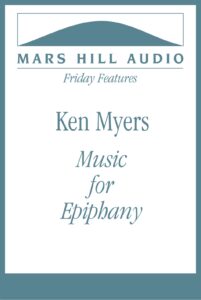
Gifts for a baby King
Ken Myers introduces listeners to various musical compositions created for Epiphany (January 6), the Church’s feast day celebrating the revelation of Christ to the world. (25 minutes)
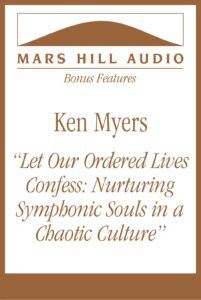
Music, silence, and the order of Creation
In this lecture, Ken Myers explains how it is that our participation in harmonic beauty in music is a kind of participation in the life of God, in Whom all order and beauty coheres and is sustained. (61 minutes)
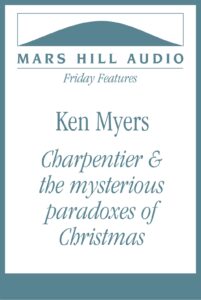
“The angels sang, and the shepherds too”
Ken Myers introduces listeners to the Christmas musical compositions of French composer Marc-Antoine Charpentier (c.1645–1704). (19 minutes)
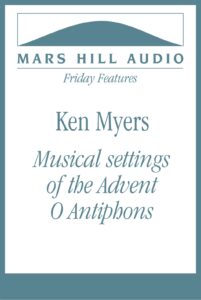
Seven Messianic titles, seven attributes of Christ
Ken Myers introduces listeners to four composers who each have set all seven of the O Antiphons to music. (17 minutes)
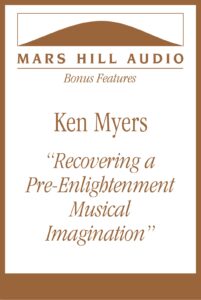
Music and the meaning of Creation
In this 2018 lecture, Ken Myers advocates for a recovery of the pre-Enlightenment idea of the intelligibility of music. (61 minutes)
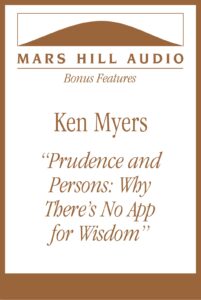
The relationship between prudence and reality
In this lecture, Ken Myers explains how the virtue of prudence is fundamentally connected with a deep and anchored understanding of reality. (54 minutes)
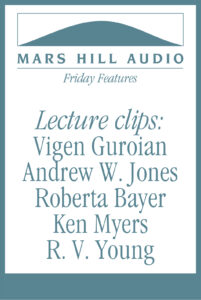
Constructing your Favorites List
Ken Myers describes the new ecosystem of Mars Hill Audio’s membership/partnership program and shares clips from five recent lectures released as Bonus Features. (26 minutes)
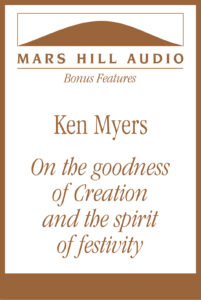
Festivity and the goodness of Creation
Drawing on Josef Pieper’s ideas, Ken Myers explains why the spirit of festivity is the spirit of worship, and that “entertainment” is ultimately an artificial, contrived, and empty effort to achieve festivity. (25 minutes)
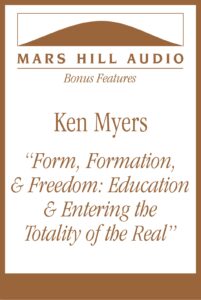
Forms as portals to reality
Ken Myers explains the ancient classical and Christian view that music embodies an order and forms that correspond to the whole of created reality, in its transcendence and materiality. (54 minutes)
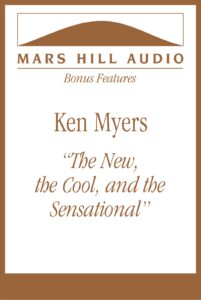
In praise of a hierarchy of taste
In a lecture at a CiRCE Institute conference, Ken Myers presented a rebuttal to the notion that encouraging the aesthetic appreciation of “higher things” is elitist and undemocratic. (58 minutes)
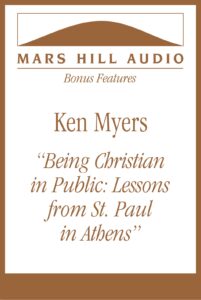
No neutral view of the cosmos
Ken Myers argues that Christians need to recover a “whole-earth discipleship” that enables them to think Christianly about all areas of life, including public life. (50 minutes)

Friendship and life together
In a lecture at Providence College, Ken Myers explores how the concept of friendship, which used to be central to political philosophy, was banished from considerations of public life as the state was exalted over society. (53 minutes)
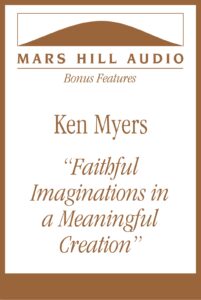
Developing a Christian aesthetic
In the inaugural lecture for the Eliot Society, titled “Faithful Imaginations in a Meaningful Creation,” Ken Myers addresses the question of the relationship between the arts and the Church. (59 minutes)
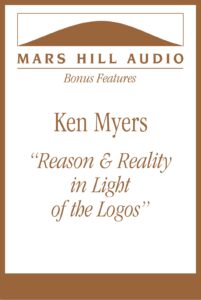
The Life was the Light of men
In a lecture from 2018, Ken Myers contrasts the Enlightenment’s understanding of reason with the Christocentric conception of reason. (57 minutes)
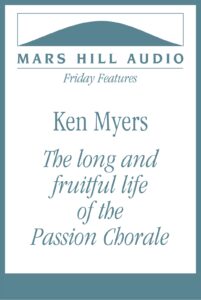
Genealogy of a work of praise
For Good Friday, Ken Myers tells the history of the text and music behind the popular hymn, “O Sacred Head, now wounded.” (27 minutes)
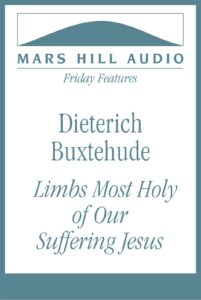
Pierced feet, wounded side, bloodied head
As Passiontide begins (the coming Sunday), Ken Myers introduces listeners to Membra Jesu Nostri, an hour-long cycle of seven cantatas written about 1680 by Dieterich Buxtehude (1637–1707). (16 minutes)
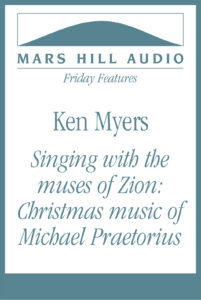
In dulci jubilo
Ken Myers introduces some of the music for the season composed by Michael Praetorius (1571–1621), best known for his settings of Es ist ein Ros entsprungen (“Lo how a rose e’er blooming”) and In dulci jubilo. (18 minutes)

About Ken Myers
Ken Myers, Host and Producer

Ken Myers did his first radio interview in 1972 when he was 19, working in college radio. His first guest was Johnny Cash. Although he wonders at times whether he peaked early, Myers insists that sociologists, historians, psychologists, and even economists can be just as interesting as country music singers.
After earning his B.A. from the University of Maryland in Communications with an emphasis in Film Theory, Myers went to work for National Public Radio (NPR), editing material for arts and performance programs. After … read more
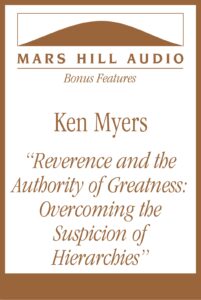
Earthly things in relation to heavenly realities
In this lecture, Ken Myers argues that the end of education is to train students to recognize what is really real. The things of this earth are only intelligible in light of heavenly realities. (59 minutes)
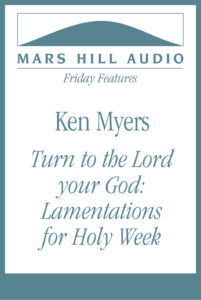
Turn to the Lord your God
Ken Myers introduces musical settings from the book of Lamentations, traditionally sung during Holy Week. (26 minutes)